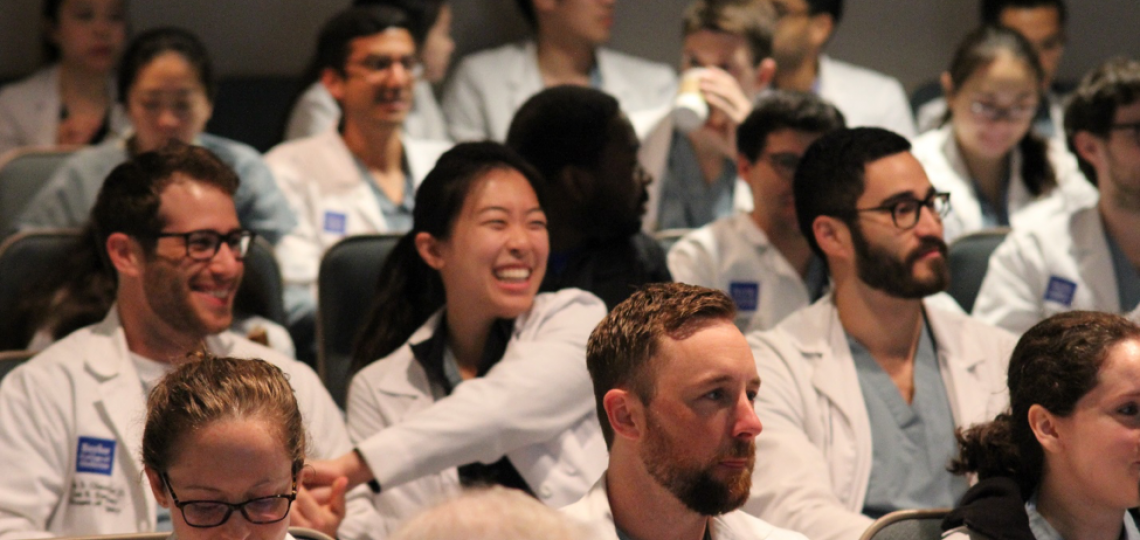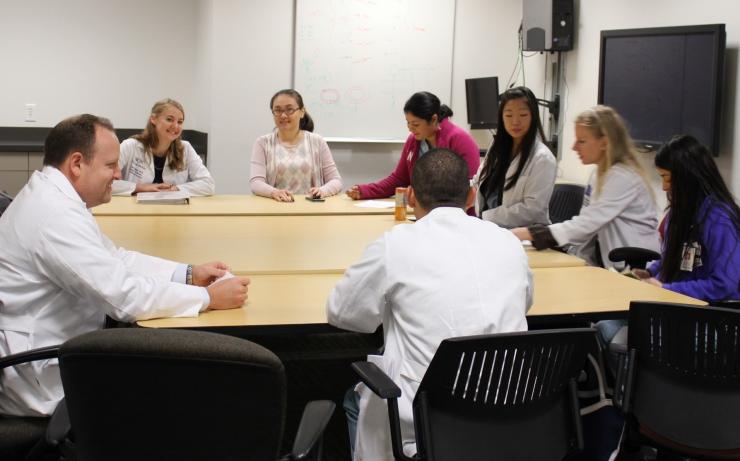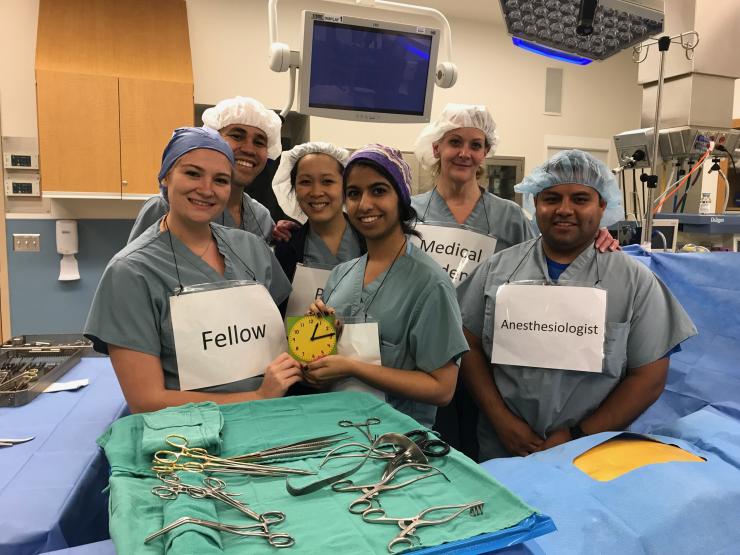
Didactic
General surgery residents are required to attend at least three weekly teaching conferences. These sessions are designed to provide learners with a diverse portfolio of learning environments to complement their clinical education. These include our Grand Rounds curriculum, our peer-supported “small groups” and faculty expert didactic sessions, and an array of non-traditional teaching venues that range from journal clubs and leadership training sessions to professionalism and career development talks and “Movie Nights” where residents have an opportunity to share and discuss operative video clips.
The Departmental Grand Rounds are held each Wednesday morning from September to June and host a combination of local faculty and acclaimed regional and national speakers, including five annual visiting professors invited to named lectureships. Topics covered include all areas of surgical specialties as well as important topics important to resident development, including leadership training, professionalism, social equity, and personal wellness. The Grand Rounds cycle also includes quarterly journal clubs with lead author call-ins and faculty/resident discussion panels and case presentation conferences highlighting key teaching cases collated over the course of the previous quarter
From July to June, residents also attend small groups, expert lectures, simulation labs, chalk talks, and wellness lectures. The curriculum incorporates various aspects of teaching, including basic science lectures, ICU summer school and boot camp, leadership training, ethics lectures, and oral board prep to ensure a broad-based education for our residents. All general surgery residents are given the online learning tool Decker Med and in-service exam prep sessions, with the option for access to Truelearn and SCORE curriculum to supplement their didactic training.
Small Groups and Lectures

As required by the Residency Review Committee for Surgery, a cycle of basic science and expert lecture series are offered annually to provide general surgery residents with access to learn in-depth fundamentals of basic and clinical science as applied to clinical surgery. All lectures are recorded and residents have access to review our directory of educational videos as a resource for their development of medical knowledge. Attendance at all lectures is mandatory.
Resident Training Modules
Knot Tying, Suture and Skin Stapling

This module focuses on basic wound closure techniques and demonstrates various knot-tying techniques.
The objectives of this module are to introduce the first-year resident to various suture materials and needles and the basics of skin stapling and staple removal.
The resident learns basic skin stapling techniques, including proper use of skin staplers and the technique for staple removal using staple extractor.
The residents learn the following knot tying techniques:
- Instrument Tie
- Hand Tie
- Two-hand Tie - square knot
- Two-hand Tie - surgeon's square knot
- Two-hand tie - slip knot
- One-hand tie - square knot
Scientific Basis of Wound Closure Techniques
This module highlights the scientific information involved in the biology of wound repair and infection, and empowers the resident to select the most appropriate surgical techniques for wound repair. This module also discusses and illustrates a variety of surgical techniques involved in achieving optimal wound closure.
The objective of this module is to introduce the first-year resident to:
- The scientific basis for selecting a wound closure technique
- Wound closure that is likely to effect the most aesthetically pleasing scar formation and a low incidence of infection
- Selecting and employing the appropriate surgical devices for wound closure
- Suture skin closure using either interrupted or continuous suture closure techniques
Basic Laparoscopy and Principles of Electrosurgery
This module introduces surgical residents to the basic principles of laparoscopy and electrosurgery. ValleyLab, Inc., presents a lecture and demonstration on the principles of electrosurgery.
The objectives of this module are to introduce the first-year resident to:
- Basic principles of laparoscopy
- Two-hand Tie - square knot
- Basic laparoscopic set-up
- Basic laparoscopic instrumentation
- Basic principles of electrosurgery by lecture and demonstration
- Basic principles of the Autosonix Scalpel
- Basic troubleshooting of laparoscopic equipment
Basic Stapling Instrumentation
This inanimate lab is designed to introduce surgical staplers to the second-year resident.
The objectives of this module are to introduce the second-year resident to the benefits of surgical stapling, the Two-hand Tie - square know, and the applications and precautions of surgical staplers.
Participants will practice these procedures in foam:
- Basic Ligation
- Wedge Resection
- Functional end-to-end anastomosis
- Billroth II
- Low Anterior resection
Laparoscopic Complications
This didactic module emphasizes potential complications associated with minimally invasive surgery.
The objective of this module is to introduce the first-, second- and third-year resident to:
- Assessment techniques used in preoperative evaluation of patients undergoing minimally invasive surgery
- Risk factors associated with minimally invasive surgery
- Treatment of potential complications
Laparoscopic Suturing
This inanimate module provides an introduction to intracorporeal suturing used in minimally invasive surgery. The residents train in the Minimally Invasive Training Lab using pelvic trainers.
This module is repeated in the second and third years to re-emphasize the need for continuous practice of suturing skills.
The objective of this module is to introduce the first, second and third year residents to:
- The objective of this module is to introduce the first, second and third year residents to:
- Techniques used for intracorporeal suturing
- Proper use of the Endostitch Applier
General Surgery Resident Minimally Invasive Surgery Animate Labs
The purpose of the Animate Lab Modules is to:
- Transfer skills and knowledge learned in the didactic sessions and in the inanimate labs into the animate lab setting
- Provide hands-on experience in the use of laparoscopic instruments
- Develop the skills necessary to perform minimally invasive surgery procedures
General Surgery Resident Minimally Invasive Surgery Animate Labs
The purpose of the Animate Lab Modules is to:
- Transfer skills and knowledge learned in the didactic sessions and in the inanimate labs into the animate lab setting
- Provide hands-on experience in the use of laparoscopic instruments
- Develop the skills necessary to perform minimally invasive surgery procedures
PGY1
- Residents attend only inanimate labs.
PGY2
- Laparoscopic Cholecystectomy and CBDE/Open Bowel Anastomosis, Open Stapling - Animate Lab
- Laparoscopic Appendectomy and Gastrostomy - Animate Lab
PGY3
- Laparoscopic Appendectomy, Cholecystectomy and CBDE - Animate Lab
- Laparoscopic Gastrostomy and Ventral Hernia Repair - Animate Lab
PGY4
- Laparoscopic Nissen and Nephrectomy/Adrenalectomy - Animate Lab
- Laparoscopic Bowel Resection and Billroth II - Animate Lab
PGY5
- Laparoscopic Nissen and Nephrectomy/Adrenalectomy - Animate Lab
- Laparoscopic Bowel Resection and Billroth II - Animate Lab
LASER Surgical Education Timeout

LASER (Locate, Assess, State, Educate, and Recap) is an innovative tool developed by our general surgery resident Dr. Denny Scaria designed to stimulate and structure student and resident learning in the operating room. LASER is initiated by the attending and/or senior resident in the operating room at the beginning of each case. Residents and students discuss with faculty what aspects of the operation they would like to teach and learn. Students, trainees and faculty discuss the success or missed opportunities of these efforts at a “debrief” at the end of each case. LASER has been well received by all participants in its first year of application, with surveys pointing to increased learning with its use. We view LASER as one of the many integrative innovations developed by our department in collaboration with our residents to enhance trainee education.
Wellness Initiative
Baylor College of Medicine and the Michael E. DeBakey Department of Surgery are committed to the ACGME requirements on Wellness, as outlined in the Program Requirements (VI.D):
Our general surgery residency program makes every effort to monitor residents on their rotations for signs of stress, fatigue, and impairment. Residents may assist on their own behalf by adhering to clinical experience and education mandates and by communicating problems with supervising faculty, the program director, associate program director, senior residents and/ or administrative team members in the surgery education office. The department provides a wellness educational curriculum that includes workshops, small groups, and leadership training to support our residents and faculty. The college also provides confidential employee assistance counseling for house staff members. Additional resources have been provided to all staff members during COVID pandemic to further support the emotional health of our team members.
Our program strives to ensure that we maintain a "Just Culture" that fosters a learning environment in which all voices and opinions are heard and respected and identified problems and challenges are addressed in a comprehensive and thoughtful manner. The integration of our Human Performance Deficiency tool and our inclusion of hospital quality improvement staff into our Morbidity and Mortality Conferences are two examples of how we approach errors or shortfalls as opportunities to improve our learning paradigm and effect immediate improvements in our health care delivery systems.
Baylor Gym: The Baylor gym provides a weight room, basketball court, racquetball court, and group fitness classes.
- Mon - Fri: 5 a.m. to 9 p.m.
- Sat - Sun: 10 a.m. to 6 p.m.
Located on 8th floor of Garage 6
Parking available in lot to the front and left of the Cullen/Main BCM Building – free from 6 p.m. to 6 a.m. with a badge.








